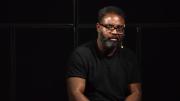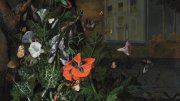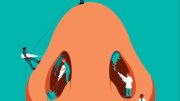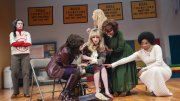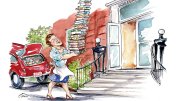“If it was a paperback, it sounded damn near like birds’ wings fluttering.” That’s how Reginald Dwayne Betts, speaking at the Graduate School of Design on Tuesday evening, described the underground library that inmates had built in the prison where he was incarcerated as a teenager: men in solitary confinement would slide books to each other, from one cell to another, the paper covers scuttling across the concrete floor. A poet, lawyer, and educator—and, as of last week, a 2021 MacArthur Fellow—Betts delivered this year’s GSD Loeb Lecture: Via Zoom, he performed part of his solo show, Felon: A play; A discourse, which is adapted from his 2019 poetry collection, Felon.
In the ad hoc prison library, Betts said, “There was only one rule: If you had a book and somebody asks for it, you had to send it.” One lonely day, looking out at a sea of prison cells that “felt as long as the Atlantic,” the newly incarcerated Betts had shouted for someone to send him a book. The one that landed in his hands was Dudley Randall’s The Black Poets—an anthology that introduced Betts to Langston Hughes, Countee Cullen, Lucille Clifton, Sonia Sanchez, Robert Hayden. And to Etheridge Knight, who spent time in prison for robbery in the 1960s. “I mean, no wonder under his poems, I could hear a man singing,” Betts said. “Name a song that tells a man what to expect after prison.” For Betts, poetry became a form of salvation.
He had gone to prison at 16 for carjacking. Tried as an adult, Betts spent almost nine years behind bars. After his release, he went back to school, first at community college, later earning a Master for Fine Arts in poetry and a Yale law degree. He is now a Ph.D. candidate in law at Yale. A practicing attorney, he has also written a memoir and three collections of poetry, and in 2019 collaborated with artist Titus Kaphar on an exhibition at the Museum of Modern Art, Redacted, which examined the human cost of the money bail system. Recently, he launched the nonprofit Freedom Reads, which donates books and shelving for libraries in prisons and organizes author visits and book circles in prisons and juvenile detention facilities.
On Tuesday, during a Q&A that followed his performance, Betts talked about his first year out of prison and finding his way toward an artistic life, and about the anger and frustration that drove—and still drives—his prodigious output and creative will. “I think part of it was because so many people told me no, consistently.” After prison, it became impossible for Betts to settle into a normal life as a teacher or attorney. His criminal record loomed over every job application—he was halfway through a course on becoming a real estate agent before he found out that his felony convictions would keep him from getting a license. And as an aspiring student, he was turned away from academic programs, including at Harvard Law School, where he recalled an admissions interviewer asking him, “How do you think your classmates will feel about your knowledge of criminal law?” Until 2011, when Betts was named a Radcliffe fellow (an application that “was pretty much a Hail Mary”), he’d found it impossible to get any teaching job. “And so I got exhausted with no,” Betts recalled, “and I'm trying to, like, invent new things, and it doesn't get easier…. I think it does make you develop a sort of recklessness. But also maybe a clarity of purpose.”
Betts also mused about how architecture and design, and the physicality of materials like paper, had shaped his life in prison. Toward the end of the Q&A, moderator John Peterson, a GSD lecturer and curator of the Loeb Fellowship, asked Betts, “Did you think much about the building, the walls, the architecture, that you had to live in?”
“Oh yeah,” Betts said. Afflicted with poor eyesight from childhood (“I’m basically blind without my glasses”), he learned early to focus on shapes and structures. The “radically different” architecture of prison was impossible to miss: the persistent straight lines and right angles, the absence of natural materials, yards without any landscaping, the strange and imposing doors. “All of these things become a part of what you understand to be an unnatural landscape,” Betts said. Later, returning to that same idea, he explained how his organization, Freedom Reads, works with craftspeople from around the country to build bookshelves for prisons. Betts described one bookshelf in particular: “The thing is gorgeous,” he said. “And it was built with somebody’s hands” out of reclaimed maple and mortar that curve and arc in ways that are singular and beautiful. “It was structured to remind people inside what living feels like. Inside, you kind of forget about the intentionality that is required to grow.” But even in prison—maybe especially in prison—beauty is important. “I do think there's something to be said about the duty that anybody who learns to design something has….No matter what it is that you're doing, when you build things in a natural world, you have to have some obligation to believe that dignity matters, even under the worst circumstances.”
